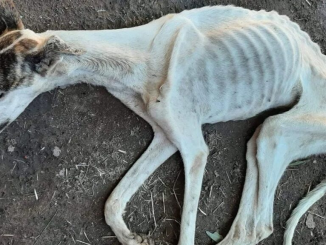
A shocking video of a Rottweiler mauling a two-year-old girl in China has prompted a crackdown by local authorities on stray dogs that some argue has now gone too far.
Authorities were initially praised for their swift response to the incident, but netizens soon began sharing accounts of stray canines in their neighborhood being roughly rounded up and, in some cases, put down.
The new directive to clamp down on large, unleashed dogs is being cited as the latest example of a knee-jerk reaction by Chinese authorities that also highlights the country’s long-standing struggle with animal rights and welfare.
“Just because a large dog bit a child, all of them are being hunted down by ruthless security guards and police,” one user wrote on Chinese social media Weibo under the hashtag “Will the biting of the girl bring stigma to a large dog?” viewed by almost 1 million users.
“Such a one-size-fits-all approach makes me really sad,” she said.
Video of the October 16 attack shows the girl stepping out of a residential compound with her mother in Chongzhou, in China’s southwestern province of Sichuan, and immediately being chased and bitten by a large black Rottweiler.
The mother tries to shield her daughter from the dog, but then tries to pull her back as the animal drags the child around.
A cleaner who comes to help with a broom also fails to drive the dog away.
A man finally succeeds in chasing the Rottweiler away with a wooden stick.
By that time, the mother is sitting on the ground, crying, with her daughter in her arms.

Calls to add Rottweilers to list of banned dogs after string of attacks
The toddler was admitted to hospital, where she was treated for a ruptured kidney, fractured ribs and bite marks on various parts of her body, several Chinese state media outlets reported.
Authorities caught the Rottweiler and detained its owner, according to state media.
Since then, local authorities in a raft of provinces including Shandong, Jiangxi, Yunnan, Hunan, Anhui have stepped up law enforcement, some more heavy-handed than others.
Stray dogs are the main targets, but pets who are unleashed can also be subject to control measures.
Most local police said they would ramp up patrols to round up stray dogs and fine owners who fail to put their dogs on a leash.
More robust approaches include police in Yanzhou in Shandong vowing to hunt down “mad dogs” and euthanize them.

The country is home to 40 million stray dogs, according to the 2021 China Pet Industry white paper.
In the past, strays have been blamed for rabies outbreaks and authorities have attempted to control their numbers with culls.
In one case that triggered an outpouring of grief online, a small stray dog – known as Xiao Huang, or little yellow – was taken away in a net by security personnel at a university campus in Chongqing and beaten to death, according to state-affiliated media.
Many netizens were perplexed by the decision to kill a tiny dog, whose image is being shared on Weibo with the hashtag “straydogxiaohuang,” with a call for greater rights for stray dogs.
The university said the canine had entered the student dormitory, posing a threat to the safety, according to state-affiliated news outlet Beijing Time.
In Shanghai, images of police officers descending on a local neighborhood and dragging away a German Shepherd also sparked fury online.
Many netizens believe the dog was old and did not pose a danger to the community.
But Shanghai authorities said they were acting on complaints from neighbors about an aggressive dog and that it was “taken in and dealt with,” according to a post on their WeChat account.
This is not the first time Chinese authorities have been accused of being heavy-handed with animals.
During Covid, some pet owners complained that their dogs were beaten to death when they were taken away for quarantine, anecdotes that sparked uproar across the internet.
A number of netizens praised the authorities for taking proactive steps, but most warned against the consequences of going overboard.
Celebrities also joined the chorus of animal lovers to call for better understanding.
Chinese actress and singer Cya Liu, who won Best Actress at the Hong Kong Film Awards last year, called for an end to the killing.
“Not all stray dogs are bad just as not all men are good,” she wrote on Weibo, with the hashtag “voicing out for stray dogs.”
Bo Ai Animal Protection Centre Of Guangyuan in Sichuan wrote on Tumblr-like Chinese social media Meipian that China should be using its development to instill a better sense of social responsibility and a respect for animals in people.
“Beating and catching dogs at every turn. Let the world see what our great motherland is like,” it said.
Unyielding Devotion: Magnus Stands by His Comatose Owner, a Tale Overflowing with Heartfelt Love

“Magnus: The Embodiment of Unconditional Loyalty and Comfort

Meet Magnus, a faithful canine companion who demonstrated unwavering loyalty when his owner, Brian Benson, faced a deep coma. For three consecutive days, Magnus refused to leave Benson’s side, leaving both doctors and onlookers deeply moved by this extraordinary display of devotion.
The loyalty of dogs is a well-known treasure, and we often turn to them for their steadfast dedication and unwavering affection. Magnus, however, takes this loyalty to a whole new level.
Brian Benson’s journey began with respiratory distress, leading to a three-night hospital stay as doctors diligently worked to diagnose his condition. Hospital stays can be incredibly trying, especially when awaiting potentially distressing news. But throughout this challenging period, Magnus remained an unwavering presence, bringing solace to Benson and providing support to his young daughters. Even though family visitation hours were limited, Magnus was granted permission to remain by Benson’s side throughout.
Magnus, a trained service dog, is a six-year-old yellow Labrador Retriever with a unique ability to care for his human companion. Together, Benson and Magnus form a dedicated team, often visiting terminally ill patients and grieving families to offer comfort and solace.
In this instance, Magnus took on the role of a comforting presence for Brian Benson. Initially adopted as a beloved family pet, his innate capacity to care for those around him prompted Benson and his family to have Magnus trained as a therapy dog.

Benson has expressed overwhelming gratitude for Magnus’ unwavering companionship during his hospital stay. It was during this challenging time that Benson received the diagnosis of cardiomyopathy, indicating a diminished functioning of his heart.

Benson shared his heartwarming story on social media, accompanied by touching videos that showcase Magnus sleeping beside him and providing comfort to his daughters during these trying circumstances.

The bond between Magnus and Benson serves as a powerful testament to the incredible loyalty and boundless love that dogs wholeheartedly offer. They remind us that in our darkest moments, our furry friends can be a beacon of light and unwavering support.



Leave a Reply